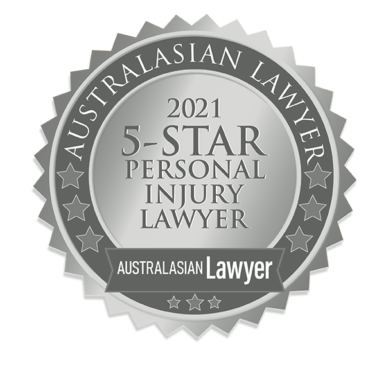
Personal Injury Claims Process.
Accidents happen at completely unexpected times, and if you’re injured it can impact every area of your life. It’s important to know that you don’t have to bear the burden of recovery alone, and personal injury claims exist to help you get your life back on track. Financial compensation after an injury can help you cover any lost wages if you have to take time off work, medical treatment and doctor’s expenses, and even lump sum payments in some circumstances. This article provides an overview of the personal injury claims process.

What is a personal injury claim?
A personal injury claim allows you to claim compensation to cover the financial costs of an injury that you’ve suffered and is usually paid for by the insurer of the person or organisation that caused your injury. A personal injury can be physical, like breaks, ligament damage, and nerve pain, or psychological, which can cause depression, anxiety, and PTSD. The personal injury claims process allows you to access payments to help you recover.
Personal injury claims fall into four main categories, depending on where the incident occurred. You’re likely to be eligible to claim if you were injured:
- In a motor vehicle accident
- At work or a work event
- In a public building (like a supermarket)
- Through medical negligence
Personal injuries are just that: personal. At Law Partners we specialise in the personal injury lawsuit process, and we know that every situation is completely unique. If you’re not sure if you’re eligible for a personal injury claim, or you don’t know where to start, get in touch with us today and we’ll offer you expert advice specific to your situation – for free.
Call 13 15 15 or chat to us now for free advice
Chat nowFind out how much you can claim.
Get startedWhat is the personal injury claims process?
Step 1: Seek medical treatment
If you get injured, then your first priority is to seek medical treatment or first aid so that you can care for your injuries. This will depend on your situation, for example, if you’re injured at work you may need to find the closest first aid respondent, or if you’re in a car accident then emergency services might be called.
Step 2: Report the injury
If you’re able to let a manager or supervisor know about your injury you should do so as soon as possible, whether you’re injured at your own place of work or somewhere public like a supermarket. If you’re involved in a motor vehicle accident then you’ll need a police report to make a claim, so if emergency services don’t attend the scene, then you’ll need to report the incident on the non-emergency line so that they can make a report. If your injury is caused by negligence, then you should alert the company that the negligent party works for.
If you’ve been injured, the personal injury claims process can be overwhelming, but you don’t have to do it alone. A lawyer who specialises in the personal injury process can help make sure you’ve contacted the right people and taken all the necessary steps. If you’re uncertain, want some advice, or just want to find out what to do next, give us a call on 13 15 15 and find out how we can help.
Step 3: Have your injuries assessed by a doctor
It’s important that a doctor assesses your injuries, so that you know how to care for them, and so there’s a record of the overall impact of what’s happened to you. If you’re unable to work, or can only work reduced hours, you can receive income support payments to cover lost wages. You’ll need your GP to assess all of your injuries and provide you with a certificate of capacity, which will outline your ability to work. You’ll have to get a new one every 28 days as part of the personal injury claims process.
Step 4: Record everything
It’s easy to forget details when you’re battling recovery and trying to navigate the personal injury claims process, but it’s really important to keep track of all the information related to your claim so that nothing gets missed down the track. We recommend to all our clients that they record all the information that they’re able to. This includes the dates and times of doctor’s appointments, pain that you experience, time off work, hobbies that you can no longer do, and anything else related to your injury. It might be worth keeping this in a journal, or even just the notes app on your phone.
Step 5: Contact a personal injury lawyer
When in doubt, ask an expert. A good personal injury lawyer will help you with lodging your claim, as well as all the little things that you might not think of but can make a huge difference to your recovery and success with the personal injury settlement process. A lawyer will be able to recommend the most suitable doctors, keep track of any deadlines, and make sure all the relevant details are included in your claim.
At Law Partners we’re specialists in the personal injury lawsuit process. While we have extensive experience with the personal injury claims process, we also understand that every claim is unique, and we’ll tailor our support to exactly what you need. If you’d like to find out how we can help you, contact us for free, personalised advice today.
Is there a time limit to making a personal injury claim?
This table provides an overview of time limits by claim type:
| Claim Type | Time Limit |
| Motor vehicle accident (CTP) | You should lodge within 28 days of the injury to receive income support payments. The time limit is three months to make a claim |
| Public liability | The time limit to make a claim is three years |
| Workers Compensation | You should lodge within six months of becoming aware of the injury. The time limit is three years to make a claim |
| Medical negligence | The time limit to make a claim is three years |
Lodging as soon as possible often makes the personal injury claims process smoother, and it’s less likely that details will get missed, however, sometimes it’s just not possible to lodge within the time frame provided. And while it’s important to keep these time limits in mind, there’s often flexibility. If you’re not sure if you’re eligible it’s always worth checking, and a personal injury lawyer will be able to determine if you’re still eligible.
Being informed about the personal injury claims process is the best way to protect yourself if you do get injured so that you can make sure you’re accessing everything that you may be entitled to. While it’s important to be mindful of time limits, it’s always worth checking if you’re still able to claim. Having a specialist personal injury lawyer on your side will give you the best chance of success, and they’ll support you as you navigate the personal injury claims process. At Law Partners we have specialist personal injury lawyers for every claim type, and we have experience navigating claims just like yours. Get in touch with us today to learn more about the personal injury claims process, speak to a lawyer who specialises in your claim type, or just for some free advice.

Chantille Khoury
Principal
Chantille is a multi-award-winning, preeminent workers compensation specialist with over 20 years’ experience. Having ranked top 6 nationwide in the highest category of the Doyle’s Guide, Chantille is now providing feedback on policy changes for the Personal Injury Commission and government bodies.
Do I have a case?
Our senior lawyers will assess your case for free.


















